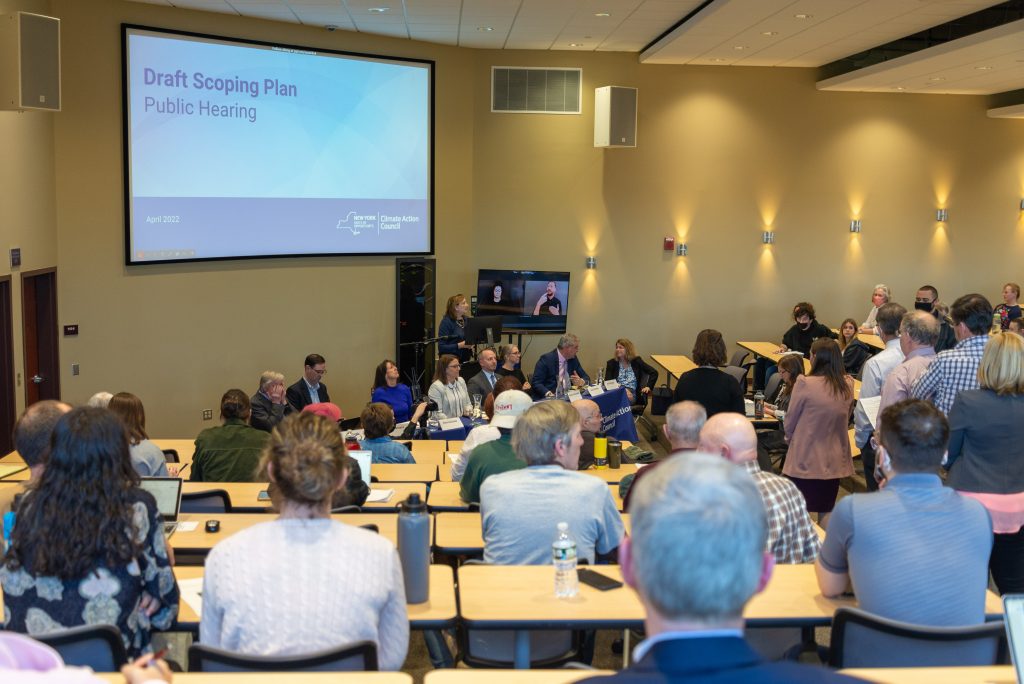Binghamton University hosted a hearing on Tuesday discussing a plan to move New York state to an infrastructure of primarily clean energy.
The New York State Climate Action Council, a 22-member committee, presented its recently created Draft Scoping Plan to the Binghamton community. The draft details ways to transition sectors such as heating, transportation and electricity generation to an energy system that is not reliant on fossil fuels. Some of the plan’s goals are to move toward zero carbon emission electricity, transportation that runs primarily on electrical power and eliminating carbon and methane emissions in various sectors of energy use, such as waste and agriculture. From April 5 to May 11, the Council is hosting a series of hearings to gauge public response to the proposal.
The committee was founded by the Climate Leadership and Community Protection Act, signed into law in July 2019. The Council was tasked with the development of proposals that aim to reduce New York state’s carbon emissions, create job opportunities in clean energy and improve the health of the state’s residents and communities. With the initial draft of the scoping plan completed, the Council plans to incorporate feedback received at these public hearings into a final scoping plan by the end of 2022.
The event started with the introductions of some key board members on the Council and a brief overview of what the Draft Scoping Plan entailed. Four scenarios are proposed by the plan to attempt to address the current climate crisis. Each scenario is built on the foundations of reduction of nonelectric travel, the spread of electrification, mitigation of methane use and a zero-emission power sector being achieved by 2040. The Council then invited those in attendance to express their questions, comments and concerns about the plan.
Anna Purtell, a junior double-majoring in biology and environmental science, said it was urgent to address the impending climate crisis with approaches focused on developing technology for wind and solar power.
“We cannot waste time with false solutions like biofuels and so-called green hydrogen as fuels, as they take more energy to produce than they generate themselves,” Purtell said. “Or those that reinforce the existing fossil fuel infrastructure and contribute to ongoing air pollution such as renewable natural gas and waste incineration. These false solutions are just a facade for maintaining old and broken systems. We cannot afford that, we need sweeping change.”
Mina Hoblitz, the government relations and public policy manager at the Greater Binghamton Chamber of Commerce and a second-year graduate student pursuing a Master of Public Administration, questioned how cost-effective the scoping plan would be. Hoblitz felt the stipulations of the plan would be too expensive for business owners, and force them to leave New York state.
“We understand how the cost associated with this plan will impact our businesses,” Hoblitz said. “Therefore, we strongly oppose any proposals that will drive employers out of our community. Our membership is extremely concerned with both your affordability and reliability.”
Others, like Sarah Nickerson, the outreach coordinator at Sustainable Tompkins — a citizen-based group that aims to promote sustainable living and working — felt switching to clean energy would reduce energy-related costs for New York state over the course of the next few decades.
“We need to resist claims regarding any need to keep fossil fuels as backup energy, or that electricity is more costly than gas,” Nickerson said. “As stated by representatives of the Climate Action Council in a recent webinar presented by the League of Women Voters of New York State, inaction by New York state will exceed the costs of the actions proposed in New York state’s climate plan by more than $90 billion.”
Similarly, a research scientist working in an analytical and diagnostics lab at BU said economic concerns are not a sufficient enough reason to stop moving toward renewable energy, and that the health of the planet and community should take precedence.
“I don’t think it makes a lot of sense to invest anymore money in fossil fuels, especially if we’re thinking about things like natural gas and whatever is a sort of bridge on technologies,” the researcher said. “It doesn’t really make sense to waste money on a temporary bridge, when you could just go straight to renewable energies.”
Some, like Mark Petzold, a resident of Tioga Center, felt that their choices regarding the plan were inconsequential if New York state did not enact regulations to reduce the use of fossil fuels and methane in energy-intensive, nonessential industries.
“My emission reduction pales in comparison to the drainage Bitcoin operation that earned 3.8 billion cubic feet of natural gas in 2021,” Petzold said. “The scoping plan mentions cryptocurrencies only once. Why is New York state leadership pandering to a known climate-damaging industry that provides no benefit to an overwhelming majority of New Yorkers? I want leadership that values my choices as a citizen, not the wishes of industry.”
Evan Ostroff, a sophomore majoring in environmental science, wrote that he felt the United States and other energy giants alike prioritize economic efficiency and affordability over the protection of natural systems.
“With the Climate Action Council pushing for 100 percent zero carbon emissions by 2040, there is hope for reversing, or at least slowing, the effects of climate change,” Ostroff wrote in an email. “As with any other environmental issue, policy implementation and action is the ultimate goal of advocacy and change.”



